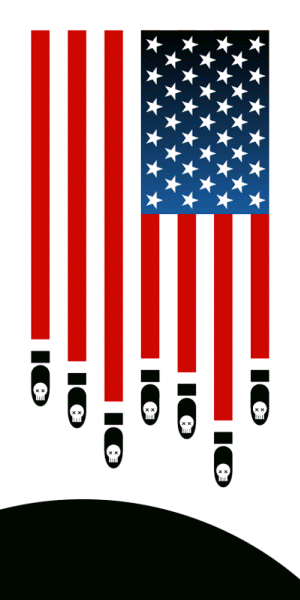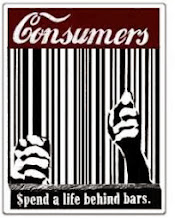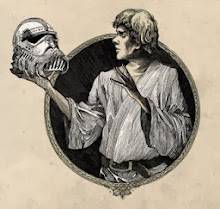Gillian Prew's A wound's sound by David McLean (Book Review)
The latest by Gillian Prew, who is the best currently active
poet in my opinion, is a short full length that is inspired by the predicament
of domestic animals and the meat industry. Fortunately it does its work by
poems that gravitate around the theme, and adumbrate the problem, rather than
preaching. The best argument for vegetarianism is purely aesthetic, like
Freud's prediction about why war would get less popular in the future, that one
simply dislikes eating dead things, rather than the hedonistic or
preferentialist utilitarian arguments that are not exactly probative.
This
Poem
This
poem has blood in its ears/
it is
being hauled up by a hook/
it is
losing consciousness.
works better than the linguistic imprecision of the wooly
arguments that sometimes purport to be reasoned defenses of the position. Prew
presents the case as a subsidiary part of a general lacrimae rerum, the
hardness of the conditions of life and the factitious emptiness of death. It is
hard enough that things die anyway, in the blooming buzzing confusion that is
also cruel and rather vulgar.
Droop-eye,
me, lodged in a hole/all my sisters weightless now. White, their gums, from
blood-loss/their lost lowing high blue. My one whole hoof shod with shit/my
best bone a blade. Clamped to the carousel with its thieving cups/its horror/
my udder droops milk for a week of babies. Fucked and forced with this
life/this breaking will hooked in the end in a concrete bowl of slaughters.
Shoved with drugs my blood is still mine/still flows in the green country. What
is this penance I have been set?/this unholy torture prized from the bloody
human hand and visited upon my sides. Sore, I am/clamped here with misery/with
a hell of bars biting about my head.
It is undoubtedly so that one may reject this latter without
refusing to eat meat humanely produced. The factory farming procedure is Gestell.
It is part of the remorseless appropriation that understands the world as
things that are there and for use. The cow is standing reserve, for
technological farming, it is there to be used as meat and the products of its
body are also for use. It is part of growing human blindness not to see the cow
as it is as organism, with presumably its own Dasein, its own presence
in the world and relation to the same, and perhaps even some little mystery,
that is not accessible to scientific appropriation.
Heidegger didn't fuck around and said that “[a]griculture is
not a motorized nourishment industry. essentially the same as the fabrication
of corpses in gas chambers and extermination camps, the same as the blockade
and starvation of nations, the same as the hydrogen bomb.” (Bremer und
Freiburger Vorträge, “Einblick in das was ist”)
Distances shrivel he said, and distances grow too. The
scientific farmer thinks we are close to the truth of the animal,
scientifically speaking; I would add that, emotionally speaking, we are miles
away. There is no distance from the standing reserve (Bestand) but nor
is there any proximity, it is the facile grabbing of the outward and obvious,
the extraneous and the blindness to the essential – in this case Gillian's cow.
And how great is the distance of a lady who worries that her
cat kills animals? In what proximity does she dwell to the natural and the cat
itself?
Anyway, the poems here are excellent, the book deserves
buying. Before concluding I must point out that the fundamental problem is that
there are way too many people. 500 000 000 seems reasonable, the same number as
there are dogs, a far better animal. A deep ecological standpoint would make
everything better for humans as well as animals, and there wouldn't be so many
humans to piss us all off.
Sun
Trap
World,
damned hieroglyph,
your
skin is not mine nor
do
your fuchsias bend like bells for me.
It is
hot today. I meet the sun alone -
more
intimate than being born.
Too
hot for human reason, yet
ants
bear colossi round my feet
World is “a chandelier of hooks and throats” but under the
world is the earth whence nature burgeons and blooms. When mankind learns to
shepherd the world, to guard and watch over what there is and pass it on in all
it surpassing excellence then maybe the chandelier can be dismantled, recycled a little. And there could be less
cruelty and still cheeseburgers. Don't forget, children, FEWER PEOPLE PLEASE.
And while we await this signal improvement, buy this book:
Author bio:
David McLean is from Wales but has lived in Sweden since 1987. He lives there with his dog, Oscar, & his computers. In addition to various chapbooks, McLean is the author of six full-length poetry collections: CADAVER’S DANCE (Whistling Shade Press, 2008), PUSHING LEMMINGS (Erbacce Press, 2009), LAUGHING AT FUNERALS (Epic Rites Press, 2010), NOBODY WANTS TO GO TO HEAVEN BUT EVERYBODY WANTS TO DIE (Oneiros Books, June 2013), THINGS THE DEAD SAY (Oneiros Books, Feb 2014), & OF DESIRE AND THE LESION THAT IS THE EGO (Oneiros Books, May 2014. A seventh full length poetry collection to be called ZARA & THE GHOST OF GERTRUDE/ ON A RAMPAGE, which is a selection of poems inspired by Gertrude Stein, is alos due from Oneiros. More information about McLean can be found at his blogs http://mourningabortion.
David McLean is from Wales but has lived in Sweden since 1987. He lives there with his dog, Oscar, & his computers. In addition to various chapbooks, McLean is the author of six full-length poetry collections: CADAVER’S DANCE (Whistling Shade Press, 2008), PUSHING LEMMINGS (Erbacce Press, 2009), LAUGHING AT FUNERALS (Epic Rites Press, 2010), NOBODY WANTS TO GO TO HEAVEN BUT EVERYBODY WANTS TO DIE (Oneiros Books, June 2013), THINGS THE DEAD SAY (Oneiros Books, Feb 2014), & OF DESIRE AND THE LESION THAT IS THE EGO (Oneiros Books, May 2014. A seventh full length poetry collection to be called ZARA & THE GHOST OF GERTRUDE/ ON A RAMPAGE, which is a selection of poems inspired by Gertrude Stein, is alos due from Oneiros. More information about McLean can be found at his blogs http://mourningabortion.












No comments:
Post a Comment